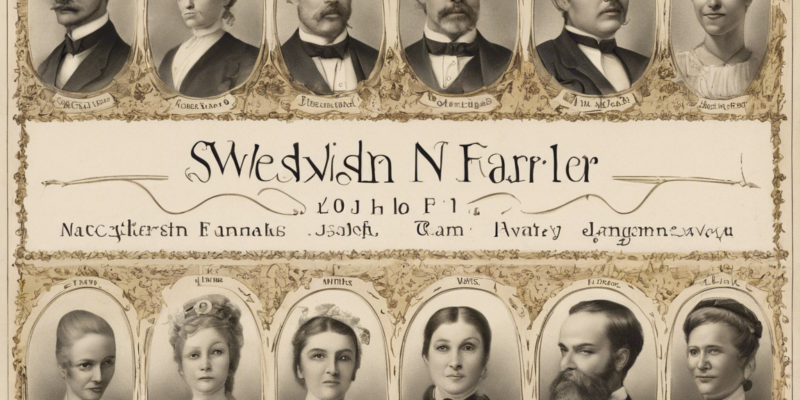Sweden, a country known for its stunning landscapes, rich history, and innovative design, is also home to a treasure trove of fascinating surnames with deep-rooted meanings. Swedish last names often reflect the country’s cultural heritage, regional influences, occupations, and even physical characteristics of the individuals or their ancestors. By delving into the origins and meanings of Swedish surnames, we can gain a deeper understanding of the country’s history and the people who bear these names.
Understanding Swedish Last Names
Swedish surnames are typically derived from various sources, including patronymic, toponymic, and occupational origins. Let’s take a closer look at some common types of Swedish last names and their meanings:
Patronymic Last Names
Patronymic surnames are among the most common in Sweden and are based on the father’s first name. The suffixes “-sson” (son of) and “-sdotter” (daughter of) are added to the father’s name to create the surname. For instance, the last name Andersson means “son of Anders,” while Larsson translates to “son of Lars.” Patronymic names provide valuable insights into a person’s ancestry and lineage.
Toponymic Last Names
Toponymic surnames are derived from a specific location, such as a farm, village, or geographic feature. These names often reflect the individual’s place of origin or residence. For example, the surname Lindberg combines “Lind” (a type of tree) and “berg” (mountain), indicating a connection to a mountain with linden trees.
Occupational Last Names
Occupational surnames indicate the individual’s profession or trade. In Sweden, names like Sjöberg (sea mountain) or Bergman (mountain man) hint at ancestral occupations or roles within the community. Understanding these occupational names provides a glimpse into the past livelihoods and societal structures in Sweden.
Common Themes in Swedish Surnames
Swedish last names often contain elements related to nature, such as animals (e.g., Ek, meaning oak), plants (e.g., Blom, meaning flower), and natural features (e.g., Strand, meaning beach). These nature-inspired names reflect Sweden’s deep connection to its environment and the importance of the natural world in shaping both the language and culture of the country.
Moreover, Swedish surnames can also convey information about physical characteristics (e.g., Lång, meaning tall), personality traits (e.g., Modig, meaning brave), or familial relationships (e.g., Kusin, meaning cousin). By analyzing these names, we can unravel the stories and attributes associated with individuals or their ancestors.
Notable Swedish Last Names and Their Meanings
- Eriksson – “son of Erik”
- Berglund – “mountain grove”
- Lindström – “Linden tree stream”
- Andersdotter – “daughter of Anders”
- Pettersson – “son of Peter”
Each of these surnames carries a piece of Swedish history and heritage, linking individuals to their familial roots and cultural identity. Exploring these names can offer a glimpse into the diverse linguistic and historical tapestry of Sweden.
FAQs about Swedish Last Names
1. Do all Swedish last names end in “-sson” or “-dotter”?
While many Swedish last names follow the patronymic tradition and end in “-sson” or “-dotter,” there are also surnames derived from occupations, locations, or other sources.
2. How have Swedish last names evolved over time?
Swedish surnames have evolved from patronymic and descriptive origins to include a wider range of sources, reflecting changes in society, culture, and language over the centuries.
3. Can Swedish last names provide clues about family history?
Yes, Swedish last names can offer insights into family history by revealing ancestral connections, occupations, locations, or physical attributes of individuals or their ancestors.
4. Are there regional variations in Swedish last names?
Yes, regional variations in Swedish last names exist, with certain regions having distinct naming conventions or influences from neighboring countries or cultures.
5. What are some common prefixes in Swedish last names?
Common prefixes in Swedish last names include “Ek-” (oak), “Lind-” (linden tree), “Berg-” (mountain), and “Strand-” (beach), reflecting nature-related themes.
Delving into the meanings behind Swedish last names unveils a world of history, culture, and identity embedded in these familial labels. By exploring the origins and themes of Swedish surnames, we can appreciate the intricate tapestry of Swedish heritage and the stories woven into each name.

